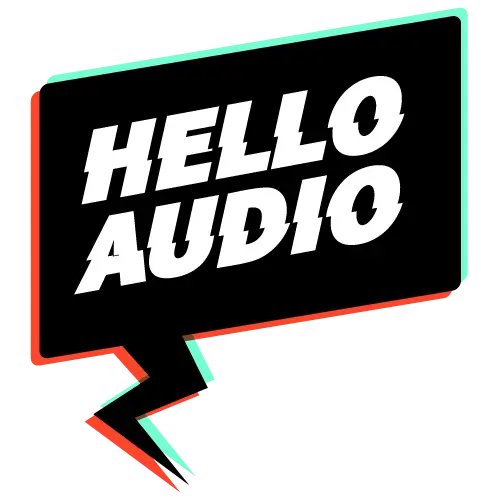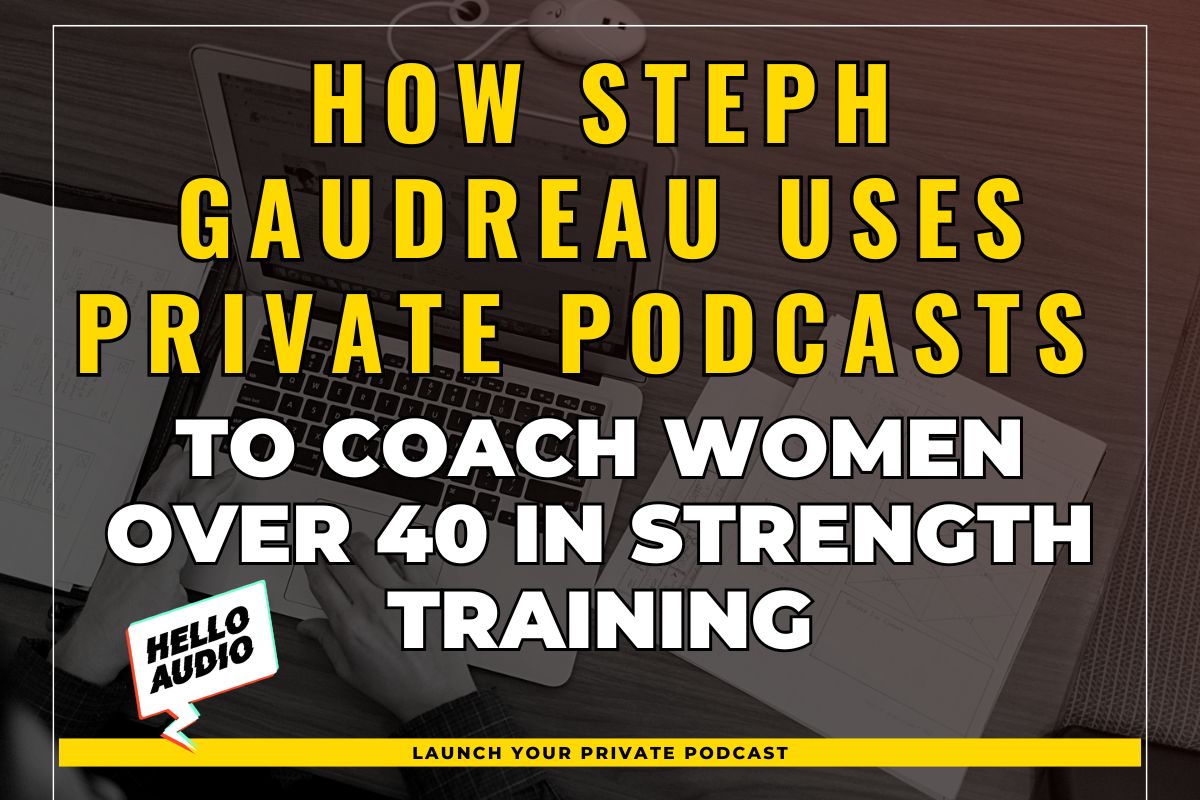Though it has a unique presence in digital e-commerce, is Gumroad the best platform for all content creators? Perhaps you want more features, a more active community, or a better platform for your specific needs.
The online marketplace is chock-full of successful Gumroad alternatives, each meeting creators’ needs by offering specialized features.
In this comprehensive guide, we will explore 14 compelling alternatives to Gumroad, helping you discover platforms that can take your digital storefront to new heights.

TL;DR – Top 14 Sites Like Gumroad
Here are 14 handpicked websites that you can choose instead of Gumroad:
- HelloAudio
- Payhip
- Shopify
- Etsy
- Podia
- Patreon
- Sendowl
- Kajabi
- Teachable
- Amazon KDP
- Lemon Squeezy
- Convertkit
- WooCommerce
- Stan Store
If you want to reach your audiences on the go while building an exclusive community of followers, you should launch a private podcast. It might sound like a difficult task (which it is), but not with Hello Audio. It is the ultimate platform to convert your existing media content into private podcasts and launch in minutes. All you need to do is book an instant demo and let us show you the way.
Now, let’s look at Gumroad and understand what the platform is, what it does, and how.
What is Gumroad?
Gumroad is a renowned e-commerce platform that specializes in digital product sales.
It targets many creators, including musicians and artists who sell music and artwork, educators who sell online courses, and writers who publish eBooks. Its user-friendly interface and fast payment process are a lifesaver for creators looking for a simple way to sell their digital products.
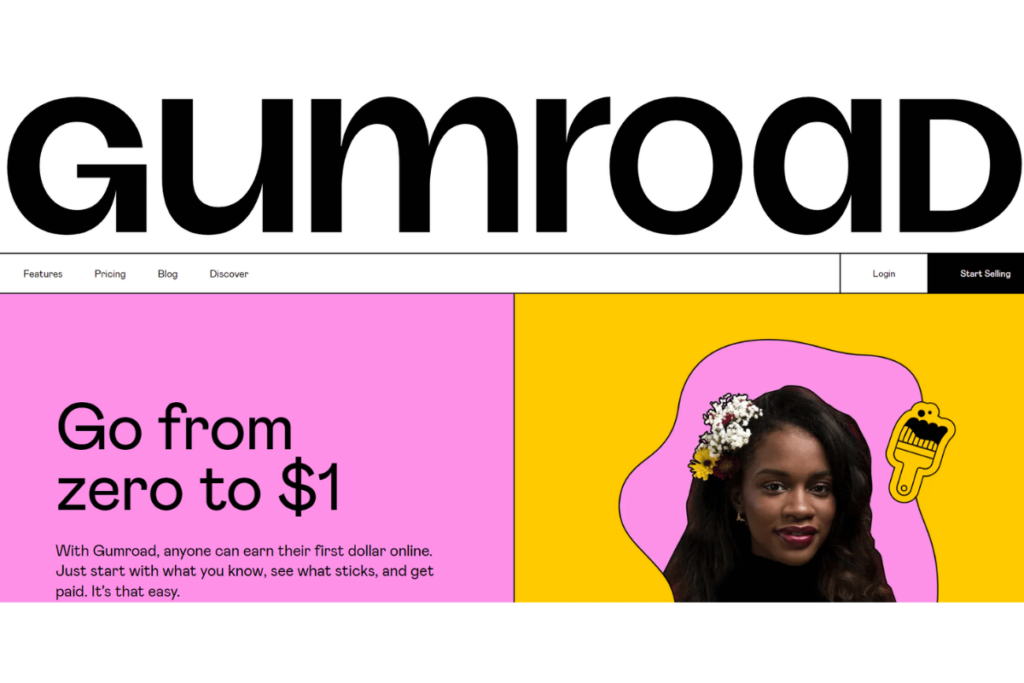
What is Gumroad Used For? How Does Gumroad Work?
Gumroad empowers content creators to market and sell their original digital products.
It provides a dynamic platform for a wide range of content, from music and publications to software and design elements.
With Gumroad, creators can:
- Manage memberships for recurring revenue
- Pre-order and crowdfund new projects
- Engage with their audience using built-in email marketing tools
- Provide streaming choices for listeners
- Enable targeted promotions and much more
Setting up your Gumroad store is a simple 3 step process:
- Create your product
- Select your pricing
- Share your store link
That’s it. The platform supports creators in growing their businesses digitally with safe delivery and data-driven insights.
How Much Does Gumroad Take?
Gumroad charges a 3.5% + $0.30 transaction fee for each sale. Payment processing fees vary depending on the payment gateway used.

Why Do People Dislike Gumroad?
While Gumroad is user-friendly and has a streamlined layout, several limitations compel people to consider other options. Here are five main reasons why some creators search for Gumroad alternatives:
Limited Product Scope
Gumroad focuses solely on digital products. That said, it might not be suitable for those who offer services, subscriptions, or physical products. Teachable, Kajabi, and SendOwl can provide more extensive solutions to such creators.
Limited Customization and Branding
Gumroad provides limited customization possibilities, which is a major deal-breaker. Creators looking for advanced branding control and a unique shop experience can choose platforms like Shopify or Squarespace.
Limited Analytics and Statistics Tracking
Gumroad gives basic sales statistics, which isn’t satisfactory in most cases. Are you looking for deeper insights into customer behavior and conversion metrics? Go for platforms like Podia or BigCommerce with more advanced analytics features.
Limited Marketing and Community Features
Gumroad does not include built-in email marketing or community tools. Creators looking for these features could look into platforms like Memberful or Thinkific, which easily incorporate these technologies.
Transaction Fees and Payment Gateways
Gumroad’s fees are competitive, no doubt. However, many creators find better solutions for their unique needs on platforms like Stripe or PayPal, which charge lower fees and have more flexible payment gateway integration.
Limited Customer Help
Gumroad provides limited customer help, largely through email. If your customer support needs are more complex, choose platforms that provide live chat or phone support, like WooCommerce.

Top 14 Best Gumroad Alternatives
Gumroad has established itself as a popular platform for selling digital products, but your business’s needs may exceed its scope. Ready to try out some alternatives?
Here are our 14 most recommended picks you can consider:
1. Hello Audio
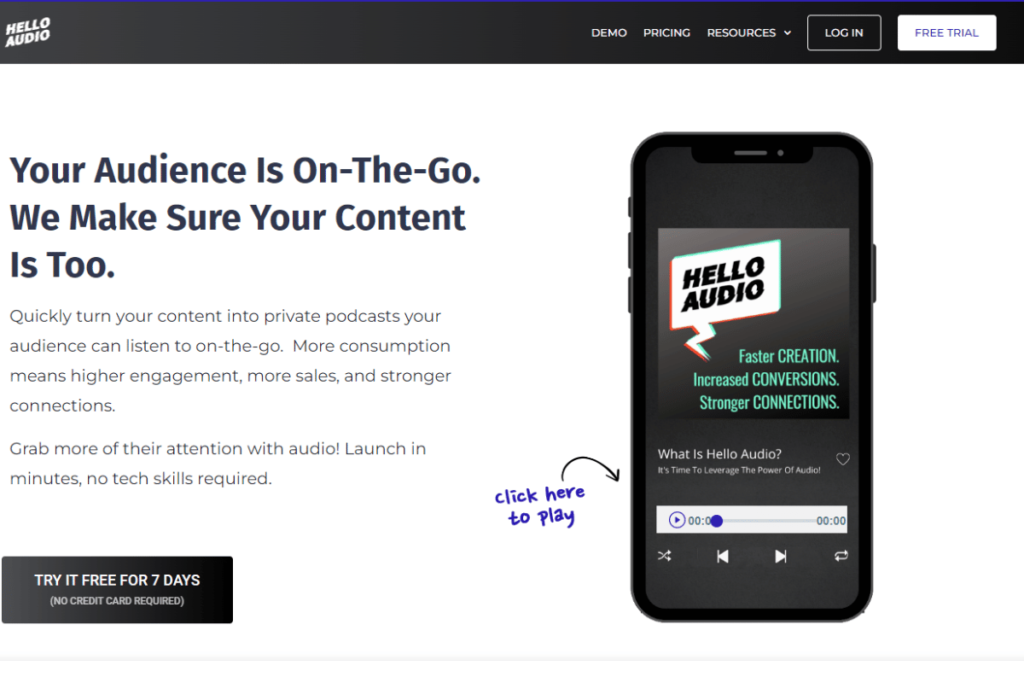
Yes, Gumroad supports audio sales. However, creators wanting to learn how to engage audiences with audio-first content would find Hello Audio a much better alternative.
Hello Audio customizes listener experiences through personalized feeds by providing suitable content based on preferences. Users can manage their audiences, monitor their listening habits, and automate actions based on their behavior.
You can simply convert existing media content to private podcasts on our platform. With features like drip content, expiring episodes, and seamless recording conversion, you can further streamline user engagement.
Go beyond essential marketing with Hello Audio and captivate your listeners with customized, dynamic audio content. Start your 7-day free trial today.
2. Payhip vs. Gumroad
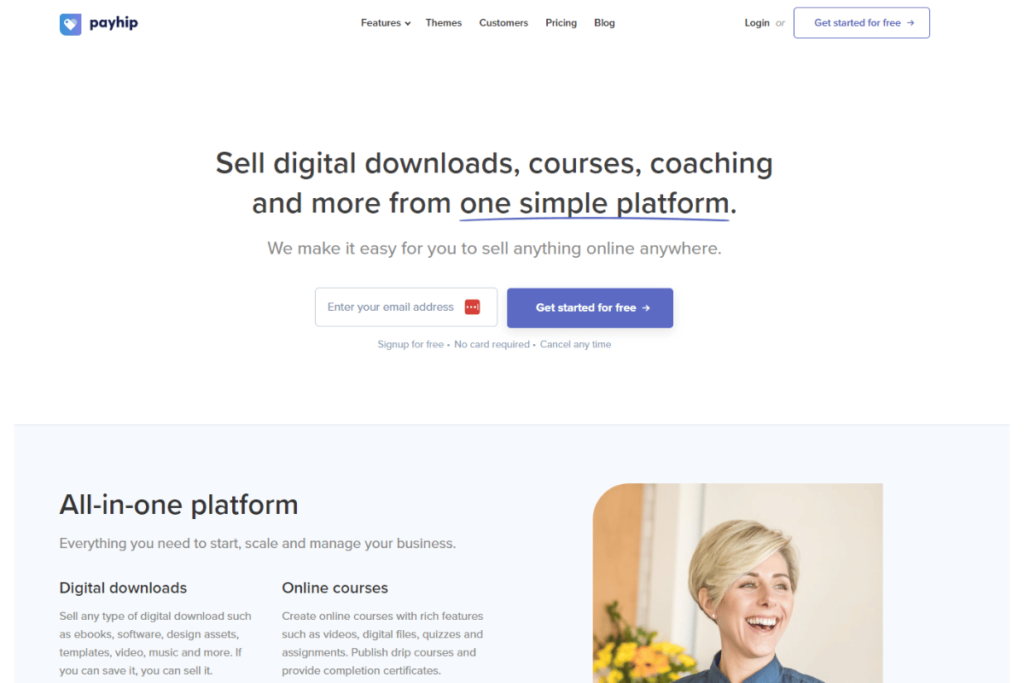
Gumroad’s user-friendly interface is ideal for creators looking for an entry-level platform to sell. However, its restricted functionality and expensive initial transaction costs might not suit everyone’s requirements.
Payhip, if compared, has more comprehensive marketing tools and community features. It also supports a broader range of product types, including physical and subscription-based products. So, it is a better option for beginners/creators who appreciate flexibility and feature-rich platforms, thanks to its free plan and lower initial cost.
3. Gumroad vs. Shopify
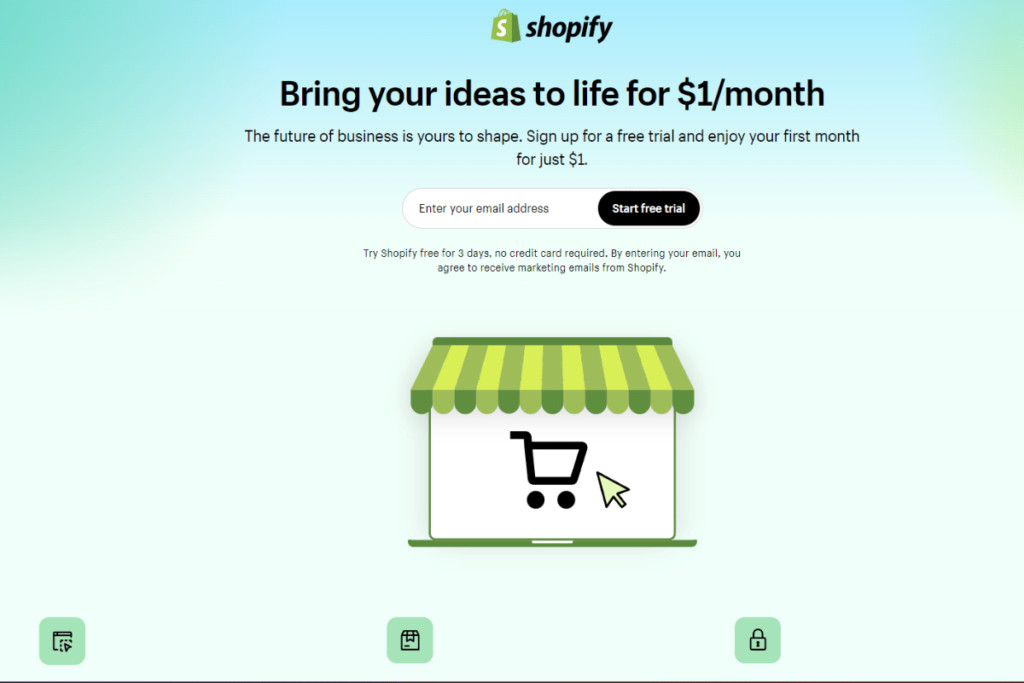
Gumroad specializes in ebooks and online courses and offers transparent pricing with a free plan. However, companies that require a wide range of product lines or extensive branding control can find their customization options too restricted.
Shopify, on the other hand, meets greater creator demands with:
- Room for both physical and digital products
- Extensive marketing tools and app integrations
On the downside, it has monthly subscriptions and transaction fees. Nevertheless, it is suitable for brands with multiple products and a heavy emphasis on branding.
4. Gumroad vs. Etsy
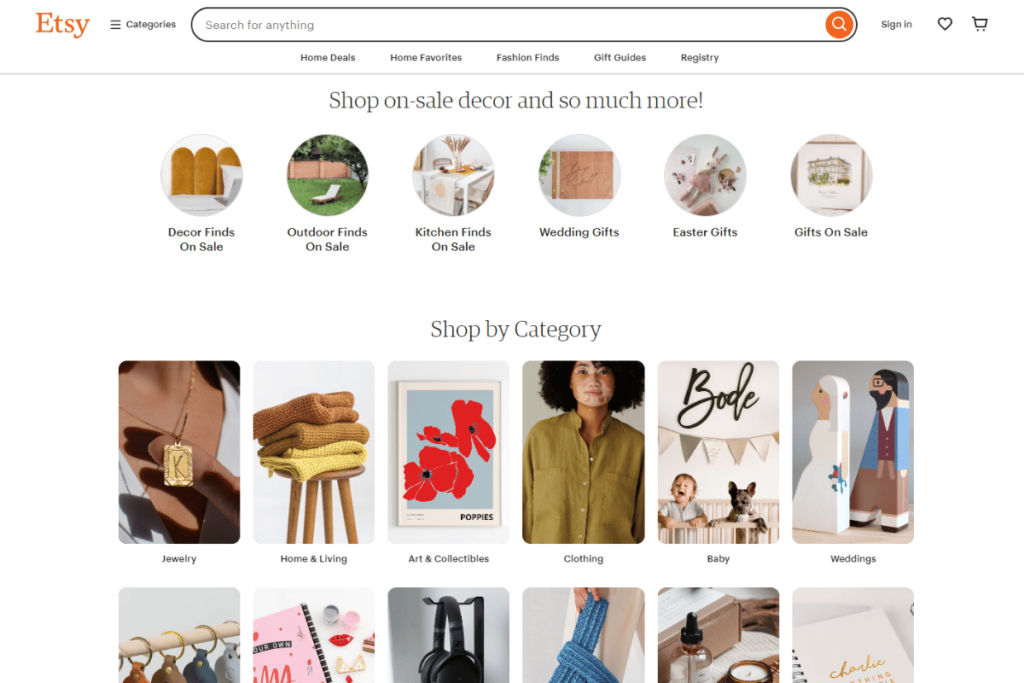
Etsy and Gumroad differ in their focus and target audience.
- Gumroad focuses on digital product sales, while Etsy focuses on handcrafted physical items and allows specific digital offerings.
- Gumroad is suitable for creators, while craftspersons mostly use Etsy.
- Etsy has a bigger community, more payment choices, and more SEO tools than Gumroad.
However, its transaction costs (6.5% per sale plus a $0.20 listing charge) could be a trade-off for many.
5. Podia vs. Gumroad
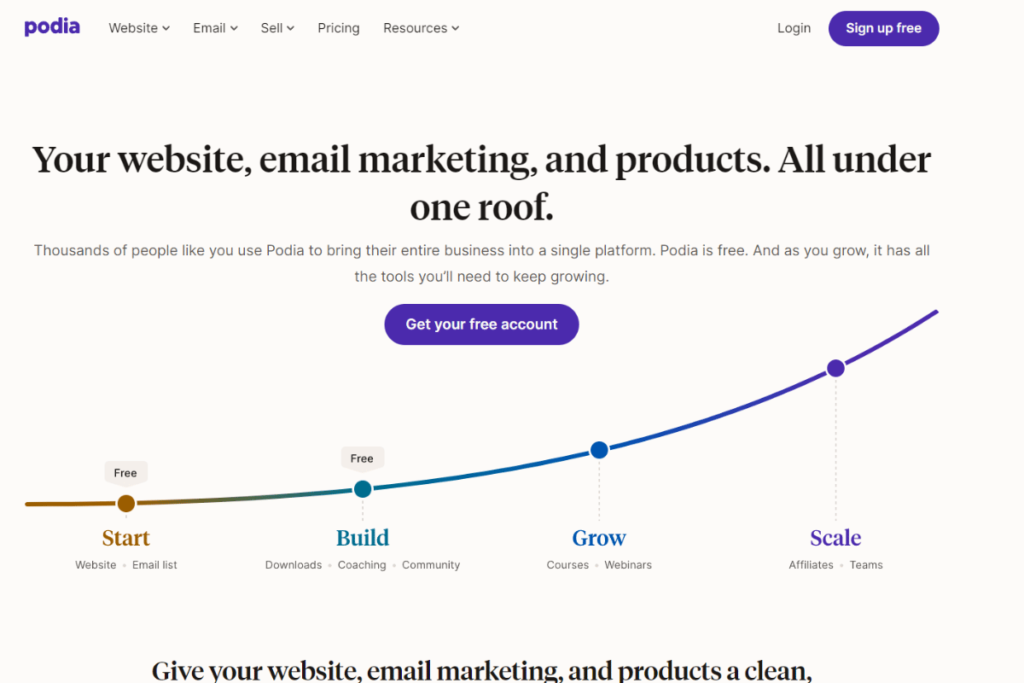
While Gumroad excels in the simple digital product sales market, Podia is a good option for creators with more ambitious goals.
This all-inclusive platform addresses memberships, coaching, online courses, and even traditional digital products.
Moreover, Podia users can also leverage:
- Email marketing
- Community building features
- Course design
- Advanced analytics
Though there is no free plan, Podia’s lower transaction fees on paid plans can be cost-effective, and its diverse creator community gives you essential support.
If your idea goes beyond digital downloads, we recommend choosing Podia’s feature-rich platform.
6. Gumroad vs. Patreon

Unlike Gumroad, Patreon focuses on recurring memberships and community interaction rather than individual product purchases.
Here, in exchange for regular patron support, creators give early access, exclusive content, or perks. Some key features of Patreon are:
- It lets you add reward-based subscription tiers
- Supports audio-first content like private and public podcasts
- Comes with extensive community tools like forums, chat, and live-streaming
If your focus is building a community, we recommend choosing Patreon.
7. Sendowl vs. Gumroad

Sendowl integrates seamlessly with your current website or landing page. You can sell digital products without creating a separate store just by using embed codes and buy buttons.
Other features are:
- It comes with a free plan, which you can change as per needs
- It supports a wide range of digital products
On the downside, it offers basic marketing features. If you currently have a website and want a versatile, cost-effective platform, Sendowl could be the answer.
8. Gumroad vs. Kajabi
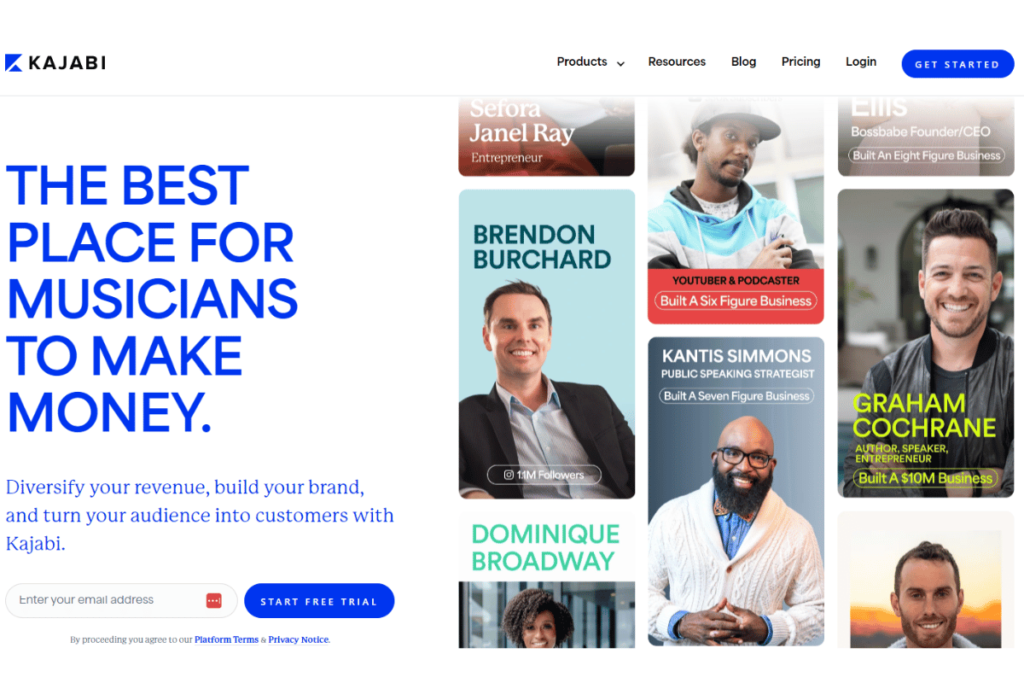
Gumroad is great at selling individual digital products, but Kajabi is better suited for creators with more dynamic ideas.
Here’s why:
- You can create and market memberships, online courses, and other specialized digital products.
- You will get advanced features like robust course design tools, website building, email marketing, and analytics.
- You can use Kajabi’s built-in forums and live chats to build a strong online community.
Therefore, Kajabi stands out for entrepreneurs looking for a feature-rich platform to create and sell complex digital products.
9. Teachable vs. Gumroad

If you’re an educator creating comprehensive online courses, Teachable could be your best Gumroad alternative platform.
Here’s why:
- Creates engaging learning experiences
- Provides tools for curriculum development, student management, and lesson delivery
- Offers several membership options
- Offers features like course hosting, quizzes, drip content, and email marketing
- Comes with built-in forums to promote engagement
- Comes with advanced customization tools to personalize your brand
However, we’d advise not to use Teachable for simple product sales. It’ll complicate the process unnecessarily.
10. Gumroad vs. Amazon KDP
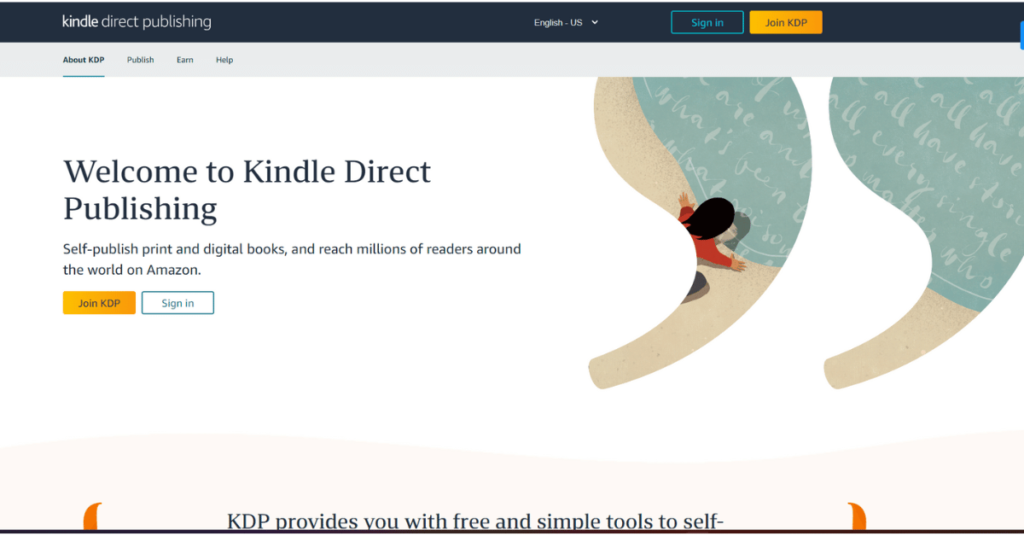
If you’re passionate about ebooks and audiobooks and want to maximize reach, we strongly recommend using Amazon Kindle Direct Publishing (KDP).
It uses Amazon’s large audience to increase visibility, but there’s a catch: you must be willing to give up some control over pricing and branding.
However, it’s not a good fit for you if:
- You sell digital products other than just ebooks and audiobooks
- You want more control over your pricing, branding, and customer interactions
In that case, Gumroad would be a better fit.
11. Lemon Squeezy vs. Gumroad
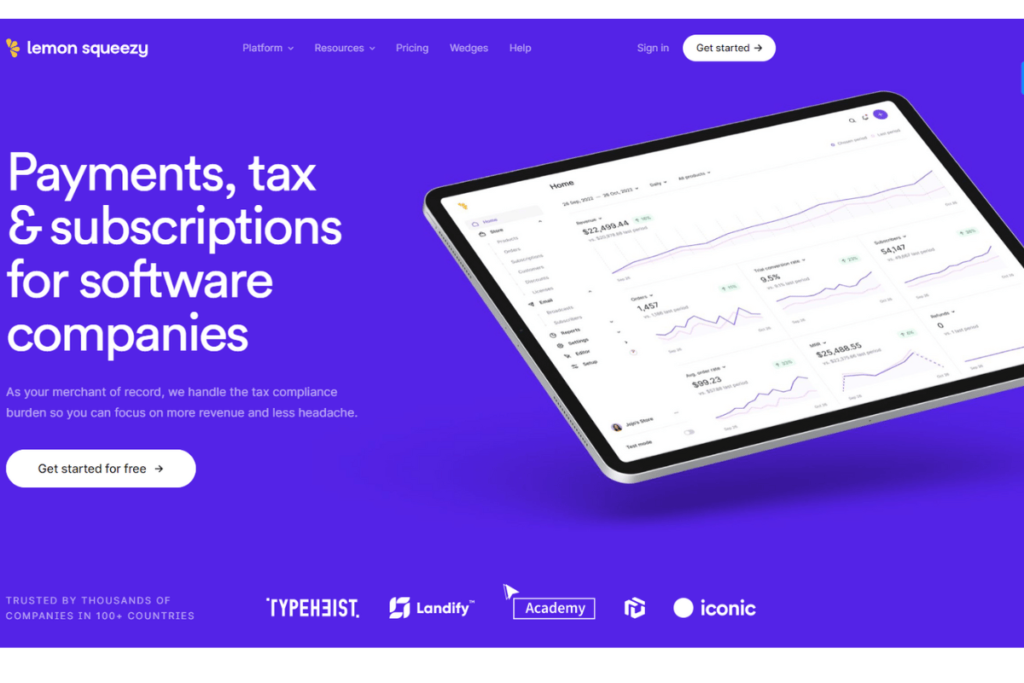
Lemon Squeezy is an ideal platform for creators and companies selling a wide range of digital products.
It extends beyond Gumroad’s single-product focus by emphasizing ebooks, courses, software, and subscriptions. The biggest deal, though, is that its costs are only 5% + 50 cents, as opposed to Gumroad’s 3.5% – 9% range.
Furthermore, Lemon Squeezy offers extensive services like:
- Tax compliance
- Numerous currencies
- Affiliate marketing
- Customizable storefronts
Ultimately, Lemon Squeezy has more features and lower prices, which makes it a more value-for-money option.
12. Gumroad vs. Convertkit

ConvertKit is more than just an email marketing tool; it’s also a creator-focused e-commerce hub.
The platform provides state-of-the-art services like:
- Comprehensive email marketing
- Landing page design
- Subscriber management
- Products, subscriptions, package sale features, and more.
With lower transaction costs on larger plans, it’s already a gem for genuine sellers. In addition, its built-in community tools, like forums and groups, make ConvertKit invaluable for building authentic customer relationships.
13. WooCommerce vs. Gumroad

WooCommerce could be the best option if you’re a driven online seller with a wide selection of products.
This Gumroad alternative is more than simply digital sales, such as:
- Major features for selling real products.
- Top-tier store personalization, from the appearance and feel to the checkout process.
- Plugins & extensions to add features like marketing automation, subscriptions, etc.
Note: While WooCommerce is free, premium extensions and hosting expenses are optional.
14. Stan Store vs. Gumroad
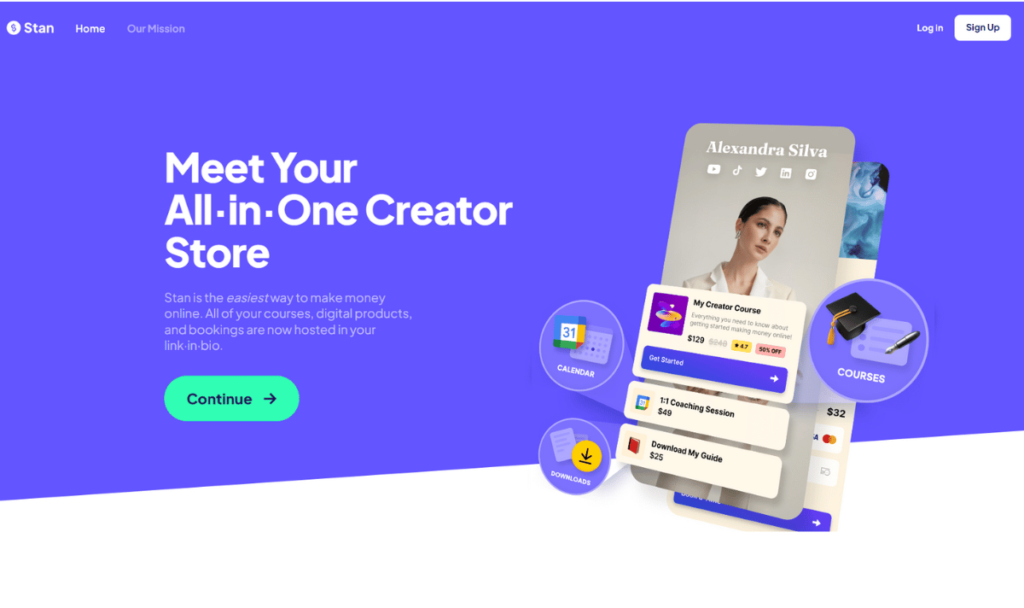
Stan Store focuses on a specific audience: influencers, social media stars, and established creators with loyal fans.
Stan stands out in a list of single product-centric platforms like Gumroad – here’s how:
- Target creators looking to establish communities
- Offers subscription-based content besides the former
- Runs on a subscription-based pricing model
- Includes features like product pages, subscriptions, gated content, community tools, and analytics.
Do you have an existing audience, enjoy community building, and provide subscriptions or gated content? If yes, Stan Store’s booming social media-focused community could help boost your revenue.
Enjoying this article? Consider saving these for later:
- 6 Steps for Top-Tier Online Community Moderation
- 13 Online Communities Examples to Get Inspired
- 12 Powerful Online Community Platforms to Consider
How to Choose the Best Option
We hear you! Narrowing down on the best Gumroad alternative for your business isn’t an easy task. Here’s our 4-step guide to ensure you’re making the right decision:
Step 1: Introspection
Begin by reflecting on your business’s basic needs before comparing options.
Ask yourself:
- What sort of digital products do you sell?
- Do you want to use a subscription-based strategy or a one-time purchase model?
- Are you in need of powerful analytics tools or advanced marketing features?
Understanding your individual needs will better guide your search.
Step 2: Research Alternatives
Explore the various Gumroad alternatives. Remember, there isn’t a single platform that is “best” for all situations. List the features you will need to fulfill your business goals. Based on that, shortlist the platforms that might meet your needs.
For instance, if you want to attract more prospects and boost success rates by 400% with audio-first content like Jaclyn Mellone, Hello Audio would be an easy choice.
Step 3: Pricing
Compare pricing structures across platforms, including transaction fees, monthly subscriptions, and any additional charges for requested features.
The cheapest option won’t be the most cost effective in the future if it lacks essential features.
Step 4: Free trial and community insights
Use the free trial periods most platforms offer to check out their features and user interface. Explore platform-specific groups or forums like G2 to learn about the experiences of existing users. It might help you make better decisions.
Conclusion
With so many Gumroad alternatives available, choosing the right one for the job might be difficult. Don’t worry, though.
You can discover the ideal platform to promote your products and succeed online by carefully analyzing your audience and unique goals.
If your focus is to build an audio-first community, trust Hello Audio as your go-to audio content partner. We specialize in converting your existing multimedia content into engaging private podcasts to make it accessible to busy people on the go.

